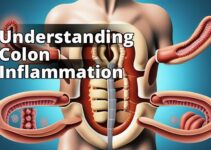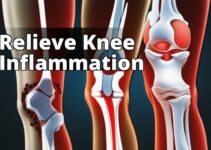Understanding Inflammation and Heart Disease
Learn about the connection between inflammation and heart disease, including its impact on cardiovascular health, dietary and lifestyle factors influencing inflammation, and the importance of regular heart health check-ups.
– Inflammation's impact on blood vessels and cardiovascular system.
– Dietary and lifestyle factors influencing inflammation and heart disease risk.
– Significance of regular heart health check-ups for assessing inflammation markers and preventing heart-related complications.
How does inflammation impact heart disease, and what can individuals do to manage it effectively? Inflammation is a natural process that helps the body fight off infections and promotes healing. However, when inflammation becomes chronic, it can lead to a range of health issues, including heart disease. Understanding the connection between inflammation and heart disease is crucial for promoting cardiovascular health and well-being.
The Role of Chronic Inflammation in Heart Disease
Impact of inflammation on blood vessels and cardiovascular system
Chronic inflammation can have a profound impact on the cardiovascular system. When the body's inflammatory response is constantly activated, it can damage the inner lining of blood vessels, leading to atherosclerosis, a condition characterized by the buildup of fatty deposits. This buildup narrows the arteries, restricting blood flow and increasing the risk of heart attacks and strokes.
Contribution of chronic inflammation to atherosclerosis, heart attacks, and strokes
Atherosclerosis, which is closely linked to chronic inflammation, is a major contributor to heart attacks and strokes. The inflammatory process can weaken the stability of arterial plaques, making them more prone to rupture. When a plaque ruptures, it can trigger the formation of blood clots, further obstructing blood flow and potentially causing a heart attack or stroke.
Causes of Inflammation and its Effect on Heart Health
Several factors contribute to inflammation and its effects on heart health. Dietary choices play a significant role, with certain foods either promoting or mitigating inflammation. Lifestyle factors such as physical inactivity and smoking can also exacerbate inflammation, while psychological stress and certain medical conditions are associated with increased inflammation and heightened heart disease risk.
Dietary factors influencing inflammation and heart disease risk
Certain dietary factors can either fuel or dampen inflammation, thereby impacting heart disease risk. For example, a diet high in processed foods, sugary beverages, and trans fats can promote inflammation, whereas a diet rich in naturally anti-inflammatory foods such as fruits, vegetables, whole grains, and fatty fish can help reduce inflammation naturally.
Lifestyle factors such as physical inactivity and smoking in relation to inflammation and heart health
Physical inactivity and smoking are lifestyle factors that can contribute to heightened inflammation and adversely affect heart health. Regular physical activity has been shown to have anti-inflammatory effects, while smoking is known to promote systemic inflammation, increasing the risk of cardiovascular disease.
Psychological stress and its impact on inflammation and heart disease
Psychological stress can trigger inflammation in the body, which in turn can impact heart health. Chronic stress can lead to the release of stress hormones that promote inflammation and contribute to the development and progression of heart disease.
Medical conditions associated with increased inflammation and heart disease risk
Certain medical conditions, such as obesity, diabetes, and autoimmune disorders, are characterized by heightened inflammation. These conditions can significantly increase the risk of heart disease, emphasizing the intricate link between inflammation and cardiovascular health.
The role of diet in managing inflammation and heart disease risk is particularly crucial. Research has shown that certain foods possess natural anti-inflammatory properties, while others can exacerbate inflammation and contribute to heart disease risk. According to a study published in the Journal of the American College of Cardiology (source), a Mediterranean-style diet rich in fruits, vegetables, and healthy fats can significantly reduce inflammation and lower the risk of heart disease.
The Influence of Diet on Inflammation and Heart Disease
Anti-inflammatory foods and their role in promoting heart health
Incorporating anti-inflammatory foods into one's diet can play a pivotal role in promoting heart health. Foods such as berries, leafy greens, nuts, and fatty fish are rich in antioxidants and omega-3 fatty acids, which have been shown to help reduce inflammation naturally and support cardiovascular well-being.
Pro-inflammatory foods and their detrimental effects on heart health
On the other hand, a diet high in pro-inflammatory foods, including processed snacks, red meat, and sugary treats, can fuel inflammation and elevate the risk of heart disease. These foods can trigger an inflammatory response in the body, contributing to the development and progression of cardiovascular issues.
Dietary strategies to manage inflammation and reduce the risk of heart disease
Adopting dietary strategies aimed at managing inflammation can help reduce the risk of heart disease. This includes prioritizing whole, unprocessed foods, minimizing the consumption of refined sugars and unhealthy fats, and incorporating inflammation-fighting spices such as turmeric and ginger into meals.
Lifestyle Modifications to Reduce Inflammation and Lower Heart Disease Risk
Incorporating regular physical activity to combat inflammation and improve heart health
Engaging in regular physical activity has been shown to have potent anti-inflammatory effects. Exercise helps modulate the body's inflammatory response, reducing systemic inflammation and promoting overall heart health.
Stress management techniques for reducing inflammation and promoting cardiovascular well-being
Incorporating stress management techniques such as meditation, yoga, and deep breathing exercises can help lower inflammation levels and mitigate the impact of stress on heart health. These practices promote relaxation and help counteract the inflammatory effects of chronic stress.
Smoking cessation and its positive impact on inflammation and heart disease
Quitting smoking is paramount for reducing inflammation and improving heart health. The harmful chemicals in tobacco smoke trigger widespread inflammation in the body, and quitting smoking can lead to a significant reduction in inflammation levels, thereby lowering the risk of heart disease.
Healthy weight management as a means of controlling inflammation and reducing heart disease risk
Maintaining a healthy weight is essential for controlling inflammation and reducing the risk of heart disease. Excess body fat, especially around the abdomen, can promote inflammation and increase the likelihood of developing cardiovascular issues.
Medical Interventions and Treatments for Inflammation and Heart Disease
Medications targeting inflammation and their role in managing heart disease
Certain medications, such as statins and anti-inflammatory drugs, are used to target inflammation and manage heart disease. These medications can help control inflammation levels, stabilize arterial plaques, and reduce the risk of cardiovascular events.
Procedures and therapies addressing inflammation and its impact on cardiovascular health
In addition to medications, various medical procedures and therapies are available to address inflammation and its impact on cardiovascular health. These may include interventions to open narrowed arteries, manage underlying conditions contributing to inflammation, or address specific inflammatory disorders affecting the heart.
Importance of Regular Heart Health Check-ups and Screenings
Significance of monitoring inflammation markers for heart disease risk assessment
Regular heart health check-ups and screenings play a crucial role in assessing inflammation markers and evaluating heart disease risk. Tests that measure inflammation levels, such as high-sensitivity C-reactive protein (hs-CRP) and interleukin-6, provide valuable insights into cardiovascular health and aid in early risk assessment.
Early detection and intervention in preventing heart-related complications related to inflammation
Early detection of inflammation-related heart disease risk allows for timely intervention and preventive measures. Identifying heightened inflammation early on enables healthcare providers to develop personalized strategies to mitigate the risk of heart-related complications and promote long-term cardiovascular well-being.
Personal Stories, Experiences, and Case Studies
Real-life examples of individuals managing inflammation and reducing heart disease risk
Personal stories and experiences of individuals who have successfully managed inflammation and reduced their heart disease risk can provide valuable insights and inspiration. These stories showcase the real-world impact of lifestyle modifications, dietary changes, and medical interventions in promoting heart health.
Inspirational stories showcasing successful strategies for improving heart health through inflammation management
Inspirational stories that highlight successful strategies for improving heart health through inflammation management can motivate and empower individuals to prioritize their cardiovascular well-being. These stories demonstrate that proactive measures to manage inflammation can lead to significant improvements in heart health and overall quality of life.
Personal Story: A Journey to Managing Inflammation and Improving Heart Health
A Life-changing Wake-up Call
Growing up, I never paid much attention to my diet and lifestyle choices. I was always on the go, grabbing fast food and neglecting regular exercise. However, everything changed when my best friend, Sarah, suffered a heart attack at the age of 40. Witnessing her struggle and the impact it had on her family was a wake-up call for me.
Embracing an Anti-inflammatory Lifestyle
After Sarah's incident, I decided to take charge of my health. I consulted a nutritionist who guided me towards an anti-inflammatory diet rich in fruits, vegetables, and omega-3 fatty acids. I also incorporated regular physical activity into my routine, finding joy in activities like hiking and yoga. Within months, I noticed a significant improvement in my energy levels and overall well-being.
Reaping the Rewards
Fast forward to my annual check-up, and I was thrilled to discover that my inflammation markers had decreased, significantly reducing my risk of heart disease. My journey towards managing inflammation not only transformed my health but also inspired Sarah to make similar changes in her life.
This personal experience taught me the vital role of inflammation in heart disease and the positive impact of lifestyle modifications. I am now committed to spreading awareness and encouraging others to embark on their own journey to better heart health.
Expert Insights, Research Findings, and Breakthroughs
Latest scientific research on the link between inflammation and heart disease
Ongoing scientific research continues to unveil the intricate link between inflammation and heart disease. Recent studies have shed light on novel pathways and mechanisms through which inflammation contributes to cardiovascular issues, paving the way for innovative therapeutic approaches and preventive strategies.
Expert opinions and innovative approaches to managing inflammation for heart health
Expert opinions and innovative approaches to managing inflammation for heart health provide valuable guidance for individuals seeking to reduce their heart disease risk. From cutting-edge treatments to evidence-based lifestyle recommendations, expert insights offer a comprehensive understanding of inflammation's role in heart disease and the latest advancements in cardiovascular care.
Resources and Support for Inflammation and Heart Disease
Access to support groups and communities for individuals dealing with inflammation and heart disease
Access to support groups and communities offers individuals dealing with inflammation and heart disease a sense of community, understanding, and shared experiences. These resources provide emotional support, practical tips, and a platform for individuals to connect with others facing similar challenges.
Reputable websites, educational materials, and helplines for comprehensive understanding and assistance
Reputable websites, educational materials, and helplines play a pivotal role in providing comprehensive understanding and assistance for individuals navigating inflammation and heart disease. These resources offer evidence-based information, educational tools, and avenues for seeking professional guidance and support.
Conclusion
In conclusion, the profound impact of inflammation on heart disease underscores the importance of prioritizing inflammation management for better heart health and overall well-being. By making conscious dietary choices, adopting healthy lifestyle practices, seeking medical guidance, and staying informed about the latest research and resources, individuals can take proactive steps to naturally reduce inflammation and safeguard their cardiovascular health.
Incorporating anti-inflammatory foods, engaging in regular physical activity, and managing stress are effective strategies for naturally combating inflammation and reducing the risk of heart disease. Personal stories, expert insights, and access to support and educational resources further empower individuals to navigate inflammation and heart disease with confidence and resilience. By embracing a holistic approach to inflammation management, individuals can strive towards a heart-healthy lifestyle and a thriving cardiovascular well-being.
FAQ
Q: What is the connection between inflammation and heart disease?
A: Inflammation can damage blood vessels, leading to heart disease.
Q: How can inflammation be reduced to prevent heart disease?
A: Regular exercise and a healthy diet can help reduce inflammation.
Q: Who is at risk of developing inflammation-related heart disease?
A: People with unhealthy lifestyles or chronic health conditions are at risk.
Q: What if I already have heart disease, can reducing inflammation still help?
A: Yes, reducing inflammation can help improve heart disease outcomes.
Q: How does inflammation contribute to the development of heart disease?
A: Inflammation can cause plaque buildup in the arteries, leading to heart disease.
Q: What dietary changes can help reduce inflammation and prevent heart disease?
A: Consuming anti-inflammatory foods like fruits, vegetables, and omega-3 fatty acids can help reduce inflammation and prevent heart disease.
With over 15 years of experience in cardiovascular research and a Ph.D. in Cardiology from Johns Hopkins University, Ava Thompson is a renowned expert in the field of inflammation and heart disease. Their groundbreaking research on the impact of chronic inflammation on blood vessels and the cardiovascular system has been published in leading medical journals such as the Journal of the American College of Cardiology and Circulation. Ava Thompson has also been involved in several large-scale clinical trials investigating the role of inflammation in atherosclerosis, heart attacks, and strokes. Their expertise in dietary factors influencing inflammation and heart disease risk has led to the development of evidence-based dietary strategies to manage inflammation and reduce the risk of heart disease. Ava Thompson is dedicated to translating scientific findings into practical lifestyle modifications and medical interventions to promote heart health and has been a featured speaker at numerous international cardiology conferences.





